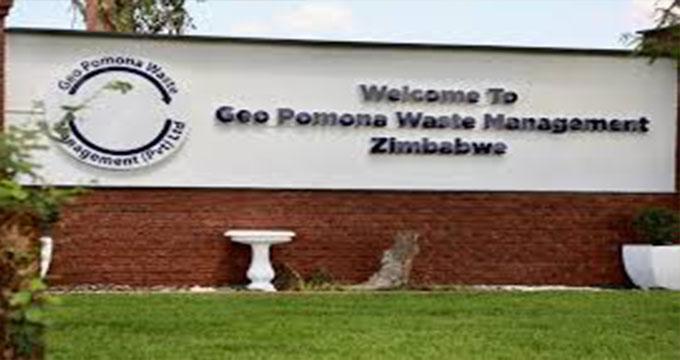News / National
Major boost for water purification
20 May 2025 at 08:58hrs |
0 Views

In a significant environmental breakthrough, the Government of Zimbabwe has inked water purification agreements with Belarus aimed at addressing the escalating problem of leachate pollution at landfill sites nationwide. This move represents a major stride toward enhanced environmental protection and modernised waste management.
The initiative focuses on treating leachate-contaminated runoff - liquid that seeps from decomposing waste in landfill dams - thereby preventing the pollution of precious groundwater and surface water resources. Untreated leachate often contains hazardous substances including heavy metals, ammonia, organic pollutants, and pathogens, posing serious risks to agriculture, biodiversity, and human health.
By purifying this toxic runoff, the project aims to reduce the accumulation of harmful chemicals in soil and water, curtailing the spread of waterborne diseases and long-term health complications linked to contaminated water sources. The urgency of this intervention is underscored by the lack of adequate containment and treatment facilities at many urban dumpsites.
Dr Dilesh Nguwaya, Executive Chairman and CEO of Geo Pomona Waste Management, told Zimpapers from Belarus that the collaboration forms part of broader efforts to bolster Zimbabwe's environmental resilience and waste infrastructure.
"We are investing in a water treatment plant because all the dam sites have leachate water, dead water. We need to clean it so that it's safe for the environment," Dr Nguwaya explained.
A Memorandum of Understanding (MoU) was signed between Geo Pomona Waste Management (Private) Limited and the Government of Belarus to foster cooperation on comprehensive waste management and sustainable environmental practices in Zimbabwe. The agreement also aims to deepen bilateral partnerships on waste management development.
Advanced treatment technologies will be introduced to enable the reuse of purified leachate in non-potable applications such as irrigation and industrial cooling, easing pressure on Zimbabwe's freshwater resources.
"Belarus has the latest technology and the Government is ready to partner with them," said Dr Nguwaya.
The Geo Pomona Waste Management facility in Harare will serve as a pilot site for the water treatment plant, designed to clean underground leachate water. The purified water is expected to support irrigation and cooling processes in waste-to-energy operations.
"This is a large-scale project that will cover the entire country, including refuse collection and waste management equipment," Dr Nguwaya added.
Beyond water quality improvements, the plant will also reduce air pollution by minimizing the release of volatile organic compounds (VOCs) and methane - harmful gases emitted by untreated leachate - thus improving air quality in landfill vicinities.
Effective leachate treatment is a critical component of responsible landfill management. It promotes sustainable waste practices, curbs environmental degradation, and aligns with Zimbabwe's commitments under the African Union Agenda 2063 and the United Nations Sustainable Development Goals.
As the project rolls out, environmental groups are urging for transparency, active community involvement, and sustainable long-term maintenance to ensure the initiative delivers lasting positive impacts.
The initiative focuses on treating leachate-contaminated runoff - liquid that seeps from decomposing waste in landfill dams - thereby preventing the pollution of precious groundwater and surface water resources. Untreated leachate often contains hazardous substances including heavy metals, ammonia, organic pollutants, and pathogens, posing serious risks to agriculture, biodiversity, and human health.
By purifying this toxic runoff, the project aims to reduce the accumulation of harmful chemicals in soil and water, curtailing the spread of waterborne diseases and long-term health complications linked to contaminated water sources. The urgency of this intervention is underscored by the lack of adequate containment and treatment facilities at many urban dumpsites.
Dr Dilesh Nguwaya, Executive Chairman and CEO of Geo Pomona Waste Management, told Zimpapers from Belarus that the collaboration forms part of broader efforts to bolster Zimbabwe's environmental resilience and waste infrastructure.
"We are investing in a water treatment plant because all the dam sites have leachate water, dead water. We need to clean it so that it's safe for the environment," Dr Nguwaya explained.
A Memorandum of Understanding (MoU) was signed between Geo Pomona Waste Management (Private) Limited and the Government of Belarus to foster cooperation on comprehensive waste management and sustainable environmental practices in Zimbabwe. The agreement also aims to deepen bilateral partnerships on waste management development.
Advanced treatment technologies will be introduced to enable the reuse of purified leachate in non-potable applications such as irrigation and industrial cooling, easing pressure on Zimbabwe's freshwater resources.
"Belarus has the latest technology and the Government is ready to partner with them," said Dr Nguwaya.
The Geo Pomona Waste Management facility in Harare will serve as a pilot site for the water treatment plant, designed to clean underground leachate water. The purified water is expected to support irrigation and cooling processes in waste-to-energy operations.
"This is a large-scale project that will cover the entire country, including refuse collection and waste management equipment," Dr Nguwaya added.
Beyond water quality improvements, the plant will also reduce air pollution by minimizing the release of volatile organic compounds (VOCs) and methane - harmful gases emitted by untreated leachate - thus improving air quality in landfill vicinities.
Effective leachate treatment is a critical component of responsible landfill management. It promotes sustainable waste practices, curbs environmental degradation, and aligns with Zimbabwe's commitments under the African Union Agenda 2063 and the United Nations Sustainable Development Goals.
As the project rolls out, environmental groups are urging for transparency, active community involvement, and sustainable long-term maintenance to ensure the initiative delivers lasting positive impacts.
Source - zimpapers
Join the discussion
Loading comments…





































